#literary arts (and crafts!)
Text
“His wedding gift, clasped around my throat. A choker of rubies, two inches wide, like an extraordinarily precious slit throat.”
- The Bloody Chamber by Angela Carter




A recent personal project. Pearls, glass, and so many meters of fishing line…
#beadwork#beading#jewelry#vampire jewelry#blood#the bloody chamber and other stories#angela carter#the bloody chamber#literary art#art#fashion#hobbies#crafting#arts and crafts
112 notes
·
View notes
Text

December, from The Procession of Months (c.1889). All the poems were written by fifteen-year-old Beatrice Crane and illustrated by her acclaimed artist father, Walter Crane.
via contentinacottage.blogspot on pinterest
text id after cut off
[TEXT ID: "December" by Beatrice Crane.
Now wildly sweeps the wind
And wildly drives the sleet
DECEMBER fast draws nigh
Wrapped close from head to feet.
Her eyes glance restlessly
From shaken tree to plain,
The dark hair 'neath her hood
Is wet with frozen rain.
Her furry cloak she holds
With one hand round her form,
The other one lifts high
A torch to light the storm
Scance tree or shrub doth cheer
The dreary scene around,
Save for the moaning wind,
There is no other sound.
December's eyes grow sad
And fainter still her tread;
One hears a long, low sight
Which tells the year is dead. /end ID]
#beatrice crane#walter crane#illustration#illustration art#english artist#british artist#seasonal poetry#seasonal quotes#literature quotes#lit quotes#literary quotes#literary quotations#arts and crafts style#arts and crafts movement#19th century art#19th century illustration#victorian art#victorian illustration#english poetry#december#december quotes#winter aesthetic#1880s#1880s art
109 notes
·
View notes
Text
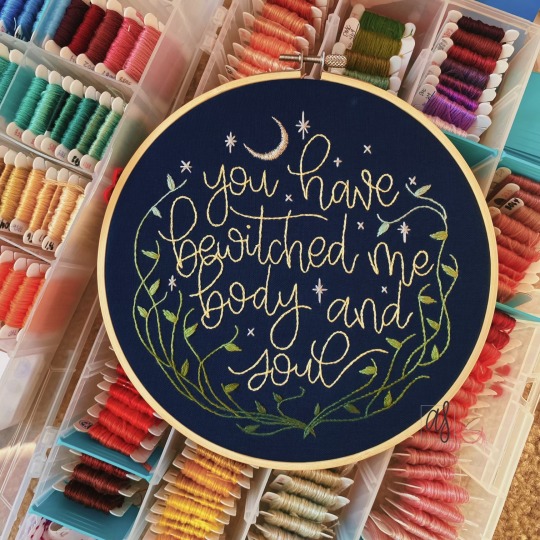
Bewitched Me PDF Pattern now available
#pride and prejudice quotes#pride and prejudice 1995#pride and prejudice#pride and predjudice 2005#Jane Austen#literature#literary quotes#embroidery art#embroidery#modern embroidery#hobby#diy craft#elizabeth x darcy#mr darcy
28 notes
·
View notes
Text
I mean this in the ace-est possible way but Dimple-in-Reigen's-body is really hot. sorry.
#'but scribe you don't experience attraction what does this even--'#I Do Not Know.#it's just. it's just the Vibes.#other things with similar Vibes include:#really good topstitching#when art is a specific kind of Very Shaped#extremely sharp knives#(ONLY craft knives tho cooking knives and weapons don't count)#olivier armstrong fullmetalalchemist#um. the concept of herb spirals in permaculture#enjambment#a lot of literary devices actually#anaphora is very sexy#sestinas if they're good#ANYWAY the point is that i went from the sort of ace person who would never in a million years use words like 'hot' or 'sexy'#to the sort of ace person who uses them and the things they describe are sure a Category#but not a category that maps in any way at all onto the commonly accepted actual definitions of the words#and then very occasionally a character will enter The Category#and i'll be like what the fuck i don't feel like that about *people*!?#and then i have to remind myself that it's the same feeling as looking at topstitching#okay that's one point#the other point is still that possessed Reigen is hot#ace stuff#mp100
60 notes
·
View notes
Text
Just 2 AM thoughts: Theory crafting is just another form of writing fanfiction, you cannot change my mind.
#I think there is this misconception that crafting theories and doing literary analyses means you are only like#spewing facts and looking at facts and everything is fact fact fact#when in actuality that is far from the case#even if you were to take a piece of work#and have two people use the same literary criticism to analyze that work#you will get two very different analyses on the same work#Sometimes these analyses can even be contradictory in nature#but both interpretations are valid and have their own merit#this is why I don't like posts that are like “Ew I hate it when people write characters as OOC”#because while yes I do despise me some certain interpretations of my favorite fictional works#I don't discredit their existence#I don't say with my whole chest that they are truly wrong and need to rethink their interpretations#Someone could have a very different interpretation of a character than me and that is perfectly valid#but I digress#Theory crafting is a creative art not a science#Everyone has their own flare to add to theory crafting#Their own personality#their own meaning#their own biases#their own self#and that is exactly like how people write fanfiction#you do research on subjects you want to know more about before writing about#you interpret a character in a certain way and write about them in that way#and you know#I think more people need to realize that#because then you'd get a lot less people going “your theory is canon/your theory is bad and not canon”#and realizing that theory crafting is another form of creative art
7 notes
·
View notes
Text
the journey of a writer is you begin writing just for the sake of writing and often hand wave details that aren't that important to you to get to the fun bits. then you decide you want to improve and you go through a rigorous process of thinking about lots of mechanics and abiding by sense and rationality, because the most damning insult to a piece of fiction is testing the reader's suspension of disbelief too much. this level of self criticism then colors the interpretation of other texts as well, where they are held to a particular standard where every detail must be perfectly logical, well researched, and contain no contradictions (cinema sins, if you will). nirvana is when you realize that doesn't matter and you go back to hand waving details that aren't that important to you.
#kat chats#i know i complained on my priv twitter abt smth like this but i just saw ANOTHER post of this caliber#i'm SO close to doing a deep dive on the suspension of disbelief and its merit as a method of literary criticism#spoiler alert i feel very strongly that if your criticism could be easily suspended through narrative buy in its not a valid critique#or at the very least the buck Does Not Stop at you not believing the author. you have to answer the question why#'it's not compelling because i'm not immersed' ok. why. what's broken the immersion#like. idk. sometimes there are interesting discussions to be had wrt narrative risk vs narrative payoff vs suspension of disbelief#and the fact of the matter is some narrative risk on the part of the author can lead to MUCH greater pay off#can lead to truly affecting art#and sometimes the narrative risk does not have a high enough reward to justify itself#sometimes this happens for only some people and other times this happens for large swathes of the population#shaping what literature we societally say is Good vs Bad#it's a good discussion to have in craft circles and to be aware of#but ultimately stories without narrative risk are almost meaningless. if they're even stories at all#and also sometimes your issue with suspension of disbelief comes down to pedantry#and forgive me but being a pedant does not make for good literary criticism#actually it makes you incredibly bad at it#you can't see the forest for the trees. you cant see the story for the extremely niche nitpicks that do nothing but buff your own ego#remind yourself that reading is not just a self indulgent exercise. you are entering a conversation where you have to listen for a long tim#and you must make meaning of all those words#you are not required to continue going through something that doesn't speak to you#anyways...
5 notes
·
View notes
Text
Posts I've seen in just the last week:
AO3 is one of the most visited sites in the world
It's ok if your fanfic [that you're writing for free in your spare time] is unfinished! You do you!
How very dare these WGA writers not finish writing my stories for me [that they spend full work days every day working on] just because they don't get compensated fairly for their paid labor and decided to go on strike?
Respect unions! Unionize your workplace! Respect picket lines!
Posts I have not seen ever but maybe it's just me ¯\_(ツ)_/¯ :
AO3 would not exist without the paid writers who are currently striking. You would have no stories to write fanfic of. The entire world your fic exists in was created by someone else's labor.
#tbh I don't like how you can't say anything remotely critical about fanfic without people getting up in arms like you're invalidating it#I very much agree fanfic is a valid art form#but most of it very much does rely on the work of writers who are able to develop narratives in ways that a lot fic writers don't need to#and who are practicing a craft they are trained in#and granted I don't really rove in fandom circles#but fanfic very much would not exist if not for someone else's world building and character development#and I haven't seen that acknowledged during this strike at all#people are expecting writers to finish their paid work when they can't even afford health insurance#I see so many posts about how fanfic is a valid genre and it is but that doesn't mean it's the same as professional writing#I love that people have such a passion for writing and storytelling that they do it for free in their spare time!#but that's not the same as doing it for a living and planning out a whole TV season's story arc before writing any episodes#it's not the same as writing every single character and plotline from scratch and understanding that process#it's not the same as understanding how to structure a novel and plan and implement literary motifs and themes and metaphors#which isn't to say fanfic can't do these things but how many fic writers do?#and tbh that's not the point of fic and that's fine but where's the acknowledgment that fics exist because other people DO
8 notes
·
View notes
Text
[Publishing] The Saltbush Review
In a rather wonderful turn of events, my very Northern Hemisphere self has been accepted into a very Southern Australian literary journal, The Saltbush Review.
Funded by Arts SA, Saltbush Review’s third issue is focused on the theme of “Intersections”, and features a diverse range of work – fiction, poetry, non-fiction, and reviews – from a diverse range of writers.
(Saltbush photo is public…

View On WordPress
#arts and crafts#arts funding#australian literary journals#creative#creativity#fiction#free fiction#hobbies#literary journals#publishing#writers on wordpress#writing
8 notes
·
View notes
Text


Emily Brontë "Fall, Leaves, Fall" greeting card
#emily bronte#fall leaves fall#autumn poetry#fall poem#bronte sisters#handmade stationery#littlefinerthings#dark academia#literary greeting card#cardmaking#paper arts#etsy shop#paper craft#etsy seller#papercraft
3 notes
·
View notes
Text
Clippings: How It Was Made
This piece was generated from a very cool writing prompt game hosted by The Voidspace Magazine:
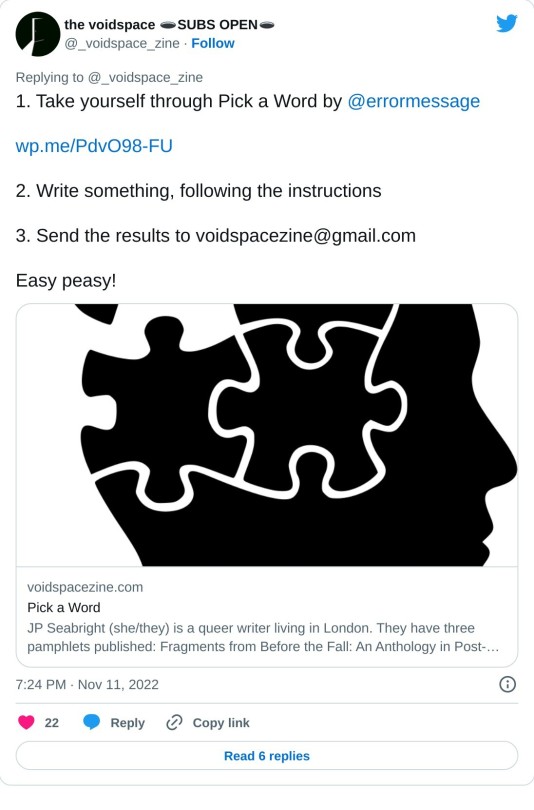

I wanted the piece that be fluid, so that there was no specific order that the three sections had to be read in. I wanted it to feel like a series of memories that can bubble up at any time unbidden. So, I modifed a template I found here:
and made them into an infinity card:
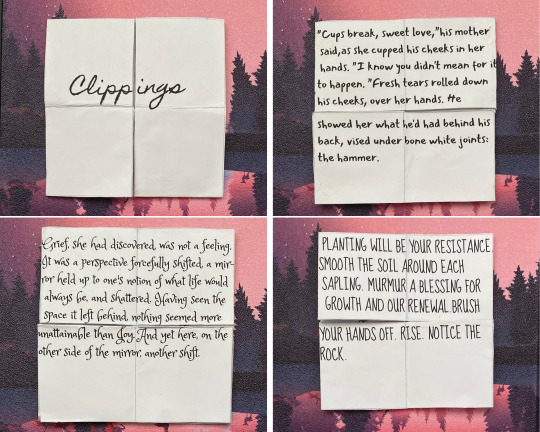

Want to make your own copy? Here's the template:
And here is a little tutorial I put together:
If videos aren't your speed, I also made this photo guide:

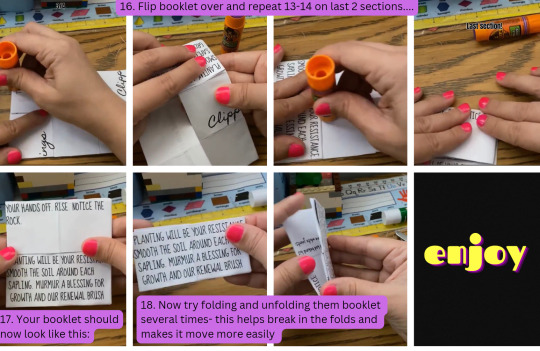
Feel free to customize it with watercolors, colored pencils, stickers, anything! I'd love to see your booklets if you feel comfortable; just tag me in a post or reblog!

#writeblr#writing#zines#writing process#fiction#how its made#interactive fiction#paper folding#neverending cards#literary arts (and crafts!)#tutorial#writing tips#diy zine#literary zine#lit mag#literary magazine#literary journal#voidspace magazine#allison dedecker#2022
13 notes
·
View notes
Text
about reader-insert because!!!

i'm hollering. crying. screaming. dying. like AAAAHHH @frenchdyer can pulverize me and i'll thank them.
i understand the stigma attached to reader-insert fics! i've been to diff fandoms since childhood (kpop & anime alike) & i believe that hierarchy in preferences has always been a constant in the platform—the same goes with pairing fics, i think, given that my circle of friends isn't particularly fond of them as well.
not sure if the same applies to my fellow reader-insert writers but what's interesting in this type of writing, in my opinion, is the challenge of establishing the psyche of a nameless main character that's as authentic as the canon ppl—like, a sense of character completeness despite major ambiguities in their identities. i also think reader-insert fics pave the way to character analyses & dynamics in a much more creative way. i enjoy reading articles that deconstruct my fave characters but as a writer, i kinda want my reader to visualize how i perceive this particular canon little meow meow of mine more literally (and i thought the best way to do so is through scenario bldgs where they could converse with you, a lovely reader!)

i'm very very grateful you were able to resonate and indulge with this nameless being i've written and *at some point* imagine my canon characters behaving with loyalty to their characterization in the material. being shy for consuming reader-insert fics is understandable, in a way, but i think those who hold that concept with disdain belittles the creative horizons people can venture in creative pieces :'D lastly, to be able to help you widen your self-perspective along the way is by far the greatest thing i've ever heard in a while.


#and wattpad as well!!#i have to admit that lib arts academe look down on that site#but when i discovered my little sister uses that app to share her art im just#we can have debates with literary content and all#but don't belittle and discourage the craft of those who try!#yay story comments ( ˶ˆᗜˆ˵ )
16 notes
·
View notes
Quote
Let's just say that inspiration is a mysterious gift that, in the hands of a "real writer," in the deliberate and conscious exercise of craft is carefully, patiently, and lovingly developed into as complete an expression of that inspired moment as the writer is able to manage. While not averse to the promptings of logic or analysis, the "real writer" accepts the gift, opens herself or himself to that inspiration, and allows the whole mind (right and left brain alike) to recombine the world "in its very atoms." The result is a creation, that, like the larger creation (or just call it the real world, if you prefer), is complex, engaging, frightening, ambiguous, beautiful, baffling, threatening, consoling, runic, and ultimately richly and meaningfully satisfying. Rhyme and meter and the essentially rhythmical nature of all "real writing," whether in poetry or fiction, may be nothing more or less than an expression of the meaningful order inherent in the cluttered Babel of language, or perhaps the meaningful order inherent in the chaos of reality itself (what William James called the "humming-buzzing confusion" of experience).
R.H.W. Dillard, Going Out Into the Crazy, at Blackbird Review
#richard dillard#on writing#r.h.w. dillard#annie dillard#hollins university#op#literary theory#quote#inspiration#on craft#on art#rhwd
3 notes
·
View notes
Photo
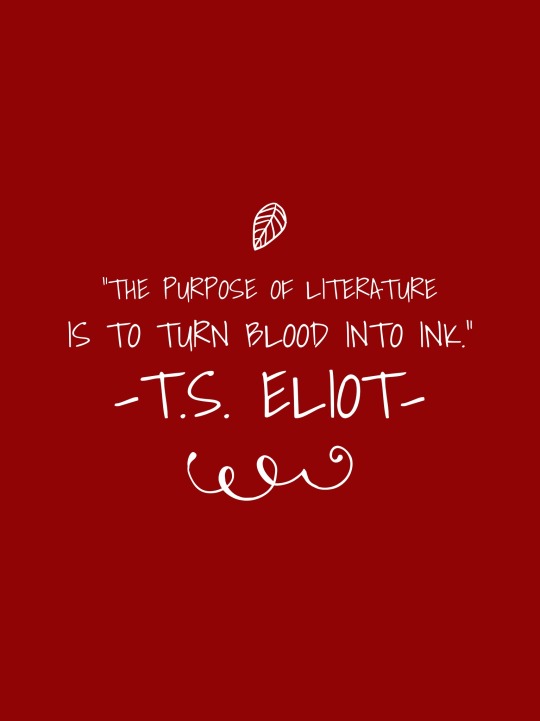
So it is, so you are—a flow of dreams transfused...
#writing#quote#on writing#love#art#literature#meaning#all eternal things#love in a time of...#the sacred interior#creative power#literary sensibilities#notes on the craft#beauty's where you find it#this is how it goes#elisa english#elisaenglish
3 notes
·
View notes
Text
i think we need like, phenomenology of any kind of media consumption? the “quick dopamine hit” is useful for understanding things, sure, but we need to balance that with our need to attempt new things.
for me, it goes:
consume a specific piece of media (as asked by someone/discovered)
find related media and situate them according to 1 (this is the bit that social media usually exploits)
once done situating, most of us still end up consuming and consuming related media, because we’ve kind of automated the “finding of/reaching to” things, which is usually the most arduous part of many tasks. think: how long it takes to get somewhere, how long it takes to find relevant things
at that point, you can do two things: move on from the genre. or be the one making works in whatever genre you’ve found yourself in (creating fanworks/thematic or theorising meta, or researchwork if you’re talking academia); it helps in situating yourself better, which is the productive part of engaging with anything. it helps you learn more about it, instead of just looking at similar things.
there’s also a third secret thing, which is being forced to consume more media on the point while paying attention to the minute details, which is the bit i hate, but usually happens because it’s easier to check than the loftier things. sorry and thank you
that’s usually how it goes for me. this i’ve seen applies to EVERYTHING: cultural norms, researchwork, art/media, most things social, beyond just actual physical navigation
#literary comprehension#literal pop psychology this is#but we’ve always existed in a world full of ‘media’#stories art and gossip have always been there#craft and social groups too#we just need to figure out how to navigate it now#with the wealth of untagged/uncategorised information assaulting us every second#this is why i advocate for mindful writing#figure out who exactly you’re talking to#otherwise we run out of steam very fast as humans#discourse#no one asked for this#for my own reference#life info#n talks
1 note
·
View note
Text
The Power of Minimalism in Writing: Saying More with Less
As I contemplate the art of writing, my thoughts circle around the profound simplicity that minimalism brings to the craft. In an era of information overload, the ability to say more with less is a skill that transcends mere brevity. It’s an exploration of how every word, like a carefully chosen brushstroke, can paint a canvas of depth and emotion.
The Weight of Every Word:
Thinking about…
View On WordPress
#Art of Omission#Brevity in Writing#Depth in Simplicity#Economy of Words#Emotion in Minimalism#Evocative Language#Impactful Writing#Literary Minimalism#Meaningful Silence#Minimalism in Writing#Minimalist Prose#Reader Imagination#Simple Writing#Thoughtful Expression#Universal Language#Writer&039;s Reflection#Writing Craft#Writing Style#Writing Techniques
0 notes
Text
On the one hand, it's true that the way Dungeons & Dragons defines terms like "sorcerer" and "warlock" and "wizard" is really only relevant to Dungeons & Dragons and its associated media – indeed, how these terms are used isn't even consistent between editions of D&D! – and trying to apply them in other contexts is rarely productive.
On the other hand, it's not true that these sorts of fine-grained taxonomies of types of magic are strictly a D&D-ism and never occur elsewhere. That folks make this argument is typically a symptom of being unfamiliar with Dungeons & Dragons' source material. D&D's main inspirations are American literary sword and sorcery fantasy spanning roughly the 1930s through the early 1980s, and fine-grained taxonomies of magic users absolutely do appear in these sources; they just aren't anything like as consistent as the folks who try to cram everything into the sorcerer/warlock/wizard model would prefer.
For example, in Lyndon Hardy's "Five Magics" series, the five types of magical practitioners are:
Alchemists: Drawing forth the hidden virtues of common materials to craft magic potions; limited by the fact that the outcomes of their formulas are partially random.
Magicians: Crafting enchanted items through complex manufacturing procedures; limited by the fact that each step in the procedure must be performed perfectly with no margin for error.
Sorcerers: Speaking verbal formulas to basically hack other people's minds, permitting illusion-craft and mind control; limited by the fact that the exercise of their art eventually kills them.
Thaumaturges: Shaping matter by manipulating miniature models; limited by the need to draw on outside sources like fires or flywheels to make up the resulting kinetic energy deficit.
Wizards: Summoning and binding demons from other dimensions; limited by the fact that the binding ritual exposes them to mental domination by the summoned demon if their will is weak.
"Warlock", meanwhile, isn't a type of practitioner, but does appear as pejorative term for a wizard who's lost a contest of wills with one of their own summoned demons.
Conversely, Lawrence Watt-Evans' "Legends of Ethshar" series includes such types of magic-users as:
Sorcerers: Channelling power through metal talismans to produce fixed effects; in the time of the novels, talisman-craft is largely a lost art, and most sorcerers use found or inherited talismans.
Theurges: Summoning gods; the setting's gods have no interest in human worship, but are bound not to interfere in the mortal world unless summoned, and are thus amenable to cutting deals.
Warlocks: Wielding X-Men style psychokinesis by virtue of their attunement to the telepathic whispers emanating from the wreckage of a crashed alien starship. (They're the edgy ones!)
Witches: Producing improvisational effects mostly related to healing, telepathy, precognition, and minor telekinesis by drawing on their own internal energy.
Wizards: Drawing down the infinite power of Chaos and shaping it with complex rituals. Basically D&D wizards, albeit with a much greater propensity for exploding.
You'll note that both taxonomies include something called a "sorcerer", something called a "warlock", and something called a "wizard", but what those terms mean in their respective contexts agrees neither with the Dungeons & Dragons definitions, nor with each other.
(Admittedly, these examples are from the 1980s, and are thus not free of D&D's influence; I picked them because they both happened to use all three of the terms in question in ways that are at odds with how D&D uses them. You can find similar taxonomies of magic use in earlier works, but I would have had to use many more examples to offer multiple competing definitions of each of "sorcerer", "warlock" and "wizard", and this post is already long enough!)
So basically what I'm saying is giving people a hard time about using these terms "wrong" – particularly if your objection is that they're not using them in a way that's congruent with however D&D's flavour of the week uses them – makes you a dick, but simply having this sort of taxonomy has a rich history within the genre. Wizard phylogeny is a time-honoured tradition!
#gaming#tabletop roleplaying#tabletop rpgs#dungeons & dragons#d&d#worldbuilding#taxonomy#phylogeny#media#literature#history#literary history#death mention
3K notes
·
View notes